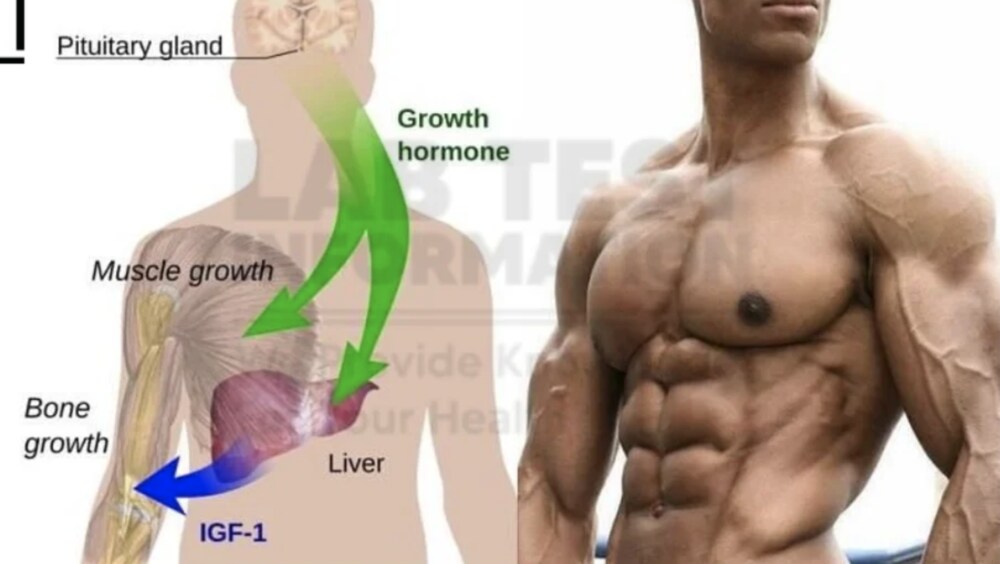Intermittent fasting (IF) has gained immense popularity in recent years as a highly effective method for weight loss, improving metabolic health, and even enhancing brain function. But what many people may not realize is that intermittent fasting also has a powerful impact on hormone regulation, particularly the production of human growth hormone (HGH).
HGH is a key hormone in the body responsible for growth, cell regeneration, metabolism, and maintaining muscle mass and skin health. It plays a crucial role in slowing down the aging process and improving overall physical performance. One of the most fascinating benefits of intermittent fasting is its ability to significantly increase the secretion of growth hormone naturally.
In this article, we will explore the science behind intermittent fasting, its relationship with human growth hormone, and how you can harness the power of fasting to boost HGH and optimize your health and fitness.
What is Intermittent Fasting?
Intermittent fasting is not a diet but a pattern of eating that alternates between periods of eating and fasting. Unlike traditional diets that focus on what you eat, intermittent fasting is concerned with when you eat. There are various approaches to intermittent fasting, but the most common ones include:
1. 16:8 Method: Involves fasting for 16 hours and eating within an 8-hour window. For example, you might eat between noon and 8 PM and fast from 8 PM until noon the next day.
2. 5:2 Method: This method involves eating normally for five days a week and drastically reducing calorie intake (500–600 calories) on two non-consecutive days.
3. 24-Hour Fasts: Some people fast for a full 24 hours once or twice a week, only consuming water, black coffee, or tea during the fasting period.
4. Alternate-Day Fasting: This involves alternating between a day of regular eating and a day of fasting (or very low-calorie intake).
Regardless of the method, intermittent fasting can have profound effects on hormone regulation, metabolism, and overall health, including its ability to stimulate the production of human growth hormone.
What is Human Growth Hormone (HGH)?
Human growth hormone, also known as somatotropin, is produced by the pituitary gland and plays an essential role in growth, metabolism, and overall cell regeneration. HGH is most active during childhood and adolescence, driving growth and development, but it continues to play an important role throughout adulthood. Here are some of its key functions:
– Promotes Muscle Growth: HGH stimulates muscle tissue growth and repair, making it vital for maintaining muscle mass and physical performance.
– Burns Fat: HGH helps break down fat stores (lipolysis) and promotes the use of fat as energy, contributing to fat loss and improved body composition.
– Supports Bone Health: It stimulates bone growth and increases bone density, helping to prevent conditions like osteoporosis as we age.
– Boosts Metabolism: HGH enhances metabolism by promoting the synthesis of proteins and the use of fats for energy.
– Improves Skin Health: By stimulating cell regeneration, HGH helps maintain skin elasticity, reduce wrinkles, and promote a more youthful appearance.
However, HGH levels naturally decline with age, leading to muscle loss, increased body fat, and a decrease in vitality. This decline is why many people seek ways to naturally boost HGH production, and intermittent fasting is one of the most effective methods.
How Intermittent Fasting Boosts Human Growth Hormone
1. Fasting Stimulates HGH Production
Multiple studies have shown that intermittent fasting can dramatically increase HGH levels. In fact, fasting for just 24 hours has been shown to boost HGH production by up to 2,000% in men and 1,300% in women. But even shorter fasting periods, like the 16:8 method, can have profound effects on growth hormone levels.
The increase in HGH during fasting is thought to occur because the body shifts its focus during periods of calorie restriction. Instead of concentrating on digestion and nutrient absorption, the body focuses on repair, fat burning, and hormone production, including the release of growth hormone.
2. Lower Insulin Levels Promote HGH Secretion
When we eat, particularly carbohydrate-rich meals, insulin levels rise in response to the influx of glucose (sugar) in the bloodstream. Insulin is a hormone that helps cells absorb glucose for energy, but elevated insulin levels can suppress HGH production.
Intermittent fasting naturally lowers insulin levels because you’re not constantly eating and introducing glucose into the bloodstream. During fasting, insulin levels drop, creating an environment that favors increased HGH secretion.. This is one reason why fasting is so effective for fat loss—it encourages the body to burn fat for fuel, and growth hormone plays a key role in that process.
3. Improved Sleep Quality Enhances HGH Release
Intermittent fasting has also been linked to better sleep quality, which is critical for HGH production. Growth hormone is primarily released during deep sleep, particularly during the first few hours of the night. By improving sleep, intermittent fasting can indirectly enhance HGH release.
Research has shown that fasting can help regulate circadian rhythms, promoting better sleep patterns. With improved sleep quality, the body can optimize its natural production of HGH, leading to better muscle recovery, fat burning, and overall vitality.
4. Weight Loss and Fat Reduction Boost HGH
Excess body fat, particularly around the abdomen, has been linked to lower HGH levels. Intermittent fasting, as an effective tool for fat loss, helps reduce body fat and improve body composition, which can further promote the secretion of growth hormone.
As you lose fat, especially visceral fat (the fat around your organs), the body becomes more efficient at producing HGH. This creates a positive cycle—higher HGH levels lead to more fat burning, and lower fat levels help the body produce more HGH.
5. Fasting Induces Cellular Repair and Autophagy
One of the most exciting benefits of intermittent fasting is its ability to trigger autophagy—a process in which the body breaks down and removes damaged cells and recycles their components for repair and regeneration. This process not only helps protect against disease and aging but also supports the production of growth hormone.
During fasting, the body goes into a “repair mode,” using stored energy and cleaning up cellular waste. This shift in energy metabolism stimulates the production of HGH, which helps repair tissues, regenerate cells, and improve overall health and longevity.
Benefits of Increased HGH Levels Through Intermittent Fasting
Boosting your HGH levels through intermittent fasting offers a wide range of health benefits, including:
1. Fat Loss and Improved Body Composition:
Elevated HGH levels enhance fat metabolism, helping the body use fat as a primary energy source. This leads to more efficient fat loss and better body composition, particularly in the abdominal region.
2. Increased Muscle Mass and Strength:
HGH is critical for muscle growth and repair. By increasing HGH levels, intermittent fasting helps preserve muscle mass during weight loss and promotes muscle strength, making it a powerful tool for those looking to maintain lean muscle while shedding fat.
3. Slower Aging Process:
Higher HGH levels are associated with a more youthful appearance, improved skin elasticity, and better hair and nail health. HGH promotes cell regeneration, which helps combat the signs of aging and keeps the skin looking firm and radiant.
4. Enhanced Physical Performance:
As HGH promotes muscle growth and fat loss, it can also lead to improved physical performance, endurance, and overall fitness. Athletes and fitness enthusiasts may find that fasting helps them recover faster and perform better in their workouts.
5. Better Bone Health:
HGH supports bone density and helps prevent the loss of bone mass that occurs with aging. This is especially important for older adults, as higher HGH levels can help reduce the risk of osteoporosis and fractures.
6. Improved Mental Clarity and Cognitive Function:
Fasting has been shown to enhance brain function by increasing the production of brain-derived neurotrophic factor (BDNF), a protein that supports brain health. Higher HGH levels further support brain function, leading to improved focus, memory, and mental clarity.
Intermittent fasting is a powerful tool for naturally boosting human growth hormone, which can improve fat loss, muscle growth, skin health, and overall vitality. By adopting a fasting routine and focusing on a nutrient-rich diet, quality sleep, and exercise, you




